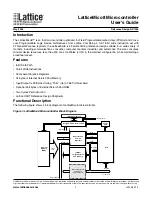Enhanced Serial Communication Interface (eSCI)
MPC5565 Microcontroller Reference Manual, Rev. 1.0
Freescale Semiconductor
20-23
NOTE
The TDRE flag is set when the shift register is loaded with the next data to
transmit from ESCI
x
_DR, which occurs approximately half-way through
the stop bit of the previous frame. This transfer occurs 9/16ths of a bit time
AFTER the start of the stop bit of the previous frame.
Toggling the TE bit from 0 to 1 automatically loads the transmit shift register with a preamble of 10 logic
1s (if M = 0) or 11 logic 1s (if M = 1). After the preamble shifts out, control logic transfers the data from
the eSCI data register into the transmit shift register. A logic 0 start bit automatically goes into the least
significant bit position of the transmit shift register. A logic 1 stop bit goes into the most significant bit
position.
The eSCI hardware supports odd or even parity. When parity is enabled, the most significant bit (Msb) of
the data character is the parity bit.
The transmit data register empty flag, TDRE, in the eSCI status register (ESCI
x
_SR) is set when the eSCI
data register transfers a byte to the transmit shift register. The TDRE flag indicates that the eSCI data
register can accept new data from the internal data bus. If the transmit interrupt enable bit (TIE), in eSCI
control register 1 (ESCI
x
_CR1) is also set, the TDRE flag generates a transmit interrupt request.
When the transmit shift register is not transmitting a frame, the TXD output goes to the idle condition,
logic 1. If at any time software clears the TE bit in eSCI control register 1 (ESCI
x
_CR1), the transmit
enable signal goes low and the TXD output goes idle.
If software clears TE while a transmission is in progress (ESCI
x
_CR1[TC] = 0), the frame in the transmit
shift register continues to shift out. To avoid accidentally cutting off the last frame in a message, always
wait for TDRE to go high after the last frame before clearing TE.
To separate messages with preambles with minimum idle line time, use the following sequence between
messages:
1. Write the last byte of the first message to ESCI
x
_DR.
2. Wait for the TDRE flag to go high, indicating the transfer of the last frame to the transmit shift
register.
3. Queue a preamble by clearing and then setting the TE bit.
4. Write the first byte of the second message to ESCI
x
_DR.
20.4.4.3
Break Characters
Setting the break bit, SBK, in eSCI control register 1 (ESCI
x
_CR1) loads the transmit shift register with a
break character. A break character contains all logic 0s and has no start, stop, or parity bit. Break character
length depends on the M bit in the eSCI control register 1 (ESCI
x
_CR1) and on the BRK13 bit in the eSCI
control register 2 (ESCI
x
_CR2). As long as SBK is set, the transmitter logic continuously loads break
characters into the transmit shift register. After software clears the SBK bit, the shift register finishes
transmitting the last break character and then transmits at least one logic 1. The automatic logic 1 at the
end of a break character guarantees the recognition of the start bit of the next frame.
Summary of Contents for MPC5565
Page 18: ...MPC5565 Microcontroller Reference Manual Devices Supported MPC5565 MPC5565 RM Rev 1 0 09 2007...
Page 34: ...MPC5565 Reference Manual Rev 1 0 Freescale Semiconductor 15...
Page 35: ...MPC5565 Reference Manual Rev 1 0 16 Freescale Semiconductor...
Page 553: ...Flash Memory MPC5565 Microcontroller Reference Manual Rev 1 0 13 38 Freescale Semiconductor...
Page 559: ...SRAM MPC5565 Microcontroller Reference Manual Rev 1 0 14 6 Freescale Semiconductor...
Page 973: ...Preface MPC5565 Microcontroller Reference Manual Rev 1 0 21 36 Freescale Semiconductor...
Page 1153: ...Calibration MPC5565 Microcontroller Reference Manual Rev 1 0 B 8 Freescale Semiconductor...


















